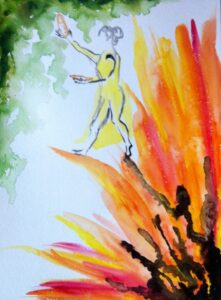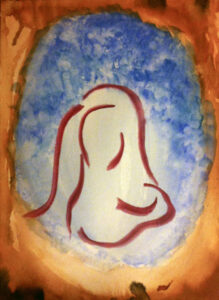Anna
 It is difficult to appreciate Anna, I think, without reading the entire Book of Tobit. It is a relatively short book, filled with the righteous and the unrighteous, with a magical fish, a companion dog, a demon, and the Angel Raphael posing as a common man. The families in the story are financially well off, but they still suffer from great physical and emotional challenges. In the midst of this is Tobit’s wife, Anna, a minor role but essential to the story. If I were casting Anna in a movie, I might consider a lesser known actress like Joan Plowright or Melissa Leo. But who I really would want to play the part of Anna is Anne Bancroft. In even the smallest of roles, Ms. Bancroft could command the screen. She could suffer like a stereotypical Jewish woman, speak her mind, and still show how a beaten down woman can accomplish all that is put in front of her.
It is difficult to appreciate Anna, I think, without reading the entire Book of Tobit. It is a relatively short book, filled with the righteous and the unrighteous, with a magical fish, a companion dog, a demon, and the Angel Raphael posing as a common man. The families in the story are financially well off, but they still suffer from great physical and emotional challenges. In the midst of this is Tobit’s wife, Anna, a minor role but essential to the story. If I were casting Anna in a movie, I might consider a lesser known actress like Joan Plowright or Melissa Leo. But who I really would want to play the part of Anna is Anne Bancroft. In even the smallest of roles, Ms. Bancroft could command the screen. She could suffer like a stereotypical Jewish woman, speak her mind, and still show how a beaten down woman can accomplish all that is put in front of her.
Anna’s husband, Tobit, is the main character of this story, written in the first person. He tells the story and he decides what is important to relay. He tells us about his struggles to be a righteous man, how he opened his home to others to share in an abundant meal, how he took risks to bury the dead. He tells in great detail how he became completely blind. For two years after his blindness his nephew Ahikar took care of him. And, oh by the way, “my wife Anna earned money at women’s work.”
The women of the Bible are just like you and me. What has changed over the past thousands of years? When financial hardship hits a family, it is often the wife who steps up to make ends meet. Ego strikes and the former breadwinner can’t stoop to a lesser job. Illness strikes and the other must earn a living. Tobit’s blindness must have affected the family’s finances, because Tobit makes a point to mention that his wife earns money for them as a weaver, right after he mentions that all his kindred feel sorry for him. Not only does Anna earn full wages for the work she does, she also earns a bonus in the form of a goat. She must be very talented at the art of weaving, “women’s work”. And what are the thanks she gets? Tobit accuses her of stealing the goat! It is as if he can’t imagine that his wife could be as successful as he had been in taking care of the family. And Anna says (imagine Anne Bancroft here), “Where are your acts of charity? Where are your righteous deeds? These things are known about you!” I see a woman with lots of hand gestures letting go of a lot of suppressed anger and frustration. I can see perhaps a dish flying through the air, maybe with a nice goat stew on it. Tobit’s reaction is not to say he is sorry, not to thank her for all she is doing to help the family. No, his reaction is to cry. Does he want us to feel sorry for him, too, that his shrewish wife brought tears to his poor, blind eyes? Tobit, she’s doing the best she can and you need to appreciate that she is doing it well enough to receive more than full wages.
All in all, I would like to read the Book of Anna and to read the story in her first person. Perhaps she cries, too. Perhaps she wishes that she is the one blinded. She could bear it better than he does. But that is not how the Bible goes. So we read, we study, we grasp at the few words spoken by women, and we reflect on our own lives to realize that this is the way of women throughout history, right down to us. We may be fortunate to marry a spouse who has the potential to care for us for the rest of our lives. We may be fortunate to be self-sufficient with a great career of our own. But when adversity strikes, we take our skills, or learn new ones, and we step up to keep our families whole.
There is so much more to this story. In a couple of weeks, let’s take a look at the other women who speak in the Book of Tobit.
++++ Coming March 15th ++++
Chapter 19
Maid of Raguel, Sarah, and Edna
Content provided by Author Lindsay Hardin Freeman
Illustration: Claire Elam






